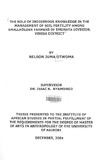| dc.description.abstract | This study was undertaken to understand the role of indigenous knowledge in soil
fertility management among smallholder farmers of Emuhaya division of Vihiga District,
western Kenya. In effect, the study sought to demonstrate that being traditionally an
agricultural community, the subjects of this study have gained and/or acquired an
elaborate knowledge and skills that relate to farming in general and soil fertility in
particular. The focus of this study, therefore, was on the indigenous knowledge
perspective of soil fertility management. The assumption being that if smallholder
farmers are to attain sustainable agriculture, future agricultural development
programmes should not only incorporate indigenous agricultural knowledge, but should
also see to it that both genders are included in the design and implementation of the
soil fertility initiatives.
The inability of smallholder farmers to cope with the requirements of the modern soil
amendment strategies was one of the reasons behind this study. The overriding factor
here was that smallholders with limited landholdings and limited or no disposable cash
income to purchase soil amendment inputs should be given the chance to explore the
use of available local resources to support their farming.
This research was carried out in Emuhaya division of Vihiga District Western Kenya. A
reconnaissance and the pre-testing of the research instrument preceded the data
collection and also included the participation in wealth ranking exercise facilitated by the
Tropical Soil Biology and Fertility. Programme (TSBF). The actual fieldwork took two
months and included the administration of a questionnaire to 100 farmers, conducting
in-depth and key informant interviews with 30 farmers and 25 key informants,
facilitating a total of 10 focus group discussions as well as direct observation in selected
farmers' fields. The findings of the study have also been complemented by literature
review on earlier studies but with similar focus. Quantitative data were analyzed using
the Statistical Package for Social Sciences(SPSS) computer package whilst qualitative
data were subjected to systematic content analysis before being analyzed further using
the ATLASti computer package.
VII
The findings of the study, suggest that farmers have detailed knowledge about their local
soils. This knowledge is gathered from many sources, mainly experience, and is
responsible for the naming and classification of local soils. Farmers also use their local
knowledge to diagnose soil nutrient status.
Smallholder farmers are also increasingly becoming worried about the fertility status of
their farms. Consequently, they continuously employ a number of strategies to manage
the fertility of their croplands. While some of these strategies are derived from modern
scientific thinking, others can be characterized as indigenous practices which have
persisted with time. This study also found that smallholders continue to face constraints
in their effort to manage the soil nutrient status. These include limited sizes of
landholdings, none or a limited number of livestock, and lack of disposable cash income
because of poverty.
The study recommends that indigenous knowledge and practices be mainstreamed in
policies that touch on land and soil management. Indeed, it is time to start initiating
processes and activities for the formulation of soil policy in Kenya. There is also need to
institute studies focusing specifically on local crops and their nutrient requirements. At
the same time, future studies should help us focus on specific inputs and how their
efficiency can be enhanced. Integration of knowledge systems and practices will surely
enhance soil fertility management among srnallholders of Emuhaya | en |

